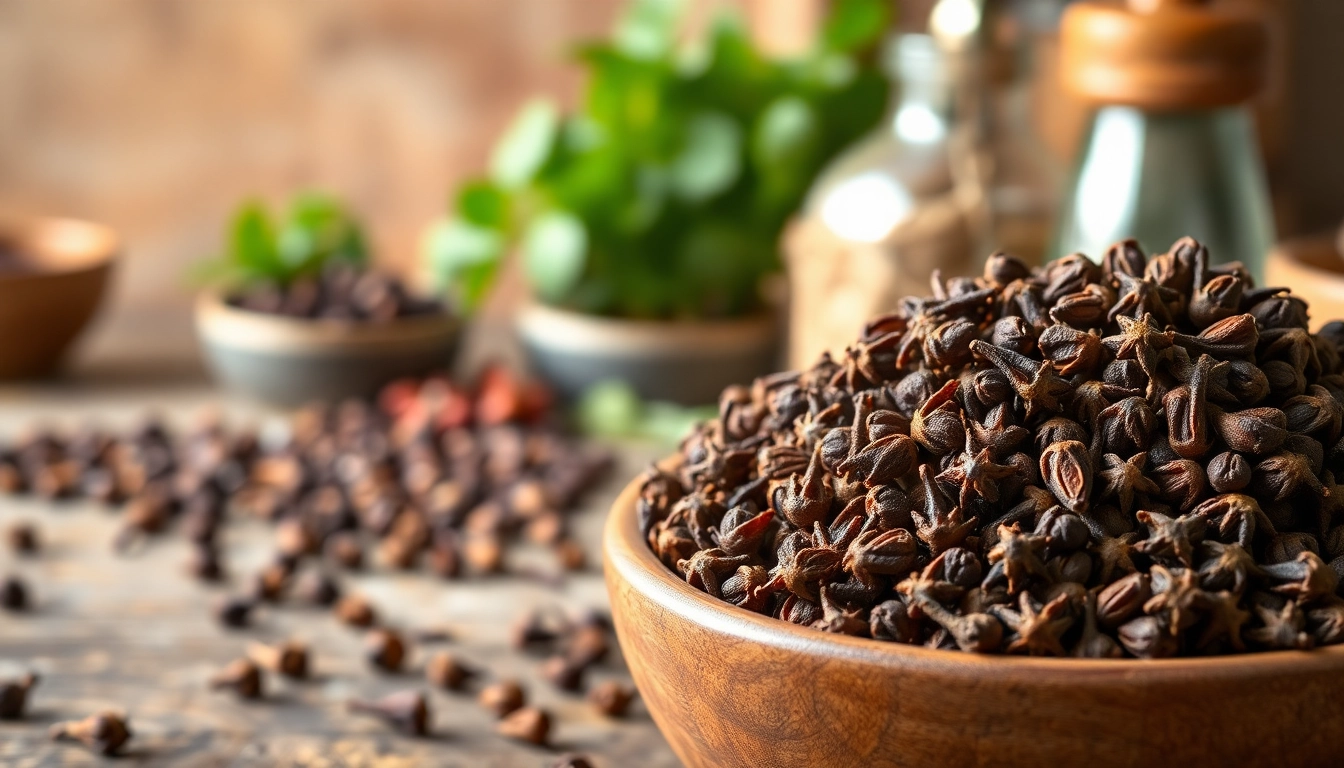Understanding Cloves and Their Origins
The Botanical Profile of Cloves
Cloves, scientifically known as Syzygium aromaticum, are the aromatic flower buds of an evergreen tree in the family Myrtaceae. These flower buds are harvested when they are still unopened and have a distinct reddish-brown color when dried. Not only are cloves recognized for their intense aroma and flavor, but they also possess a unique set of organic compounds that contribute to their health benefits. The majority of cloves come from Indonesia, particularly the Maluku Islands, where the climate is ideal for their cultivation.
Historical Significance of Cloves in Cuisine
Historically, cloves have played a significant role in global cuisines and trade. Their value was so high in ancient times that they were often used as currency. The spice was especially sought after in Roman and medieval times; it was used in various dishes, medicines, and even religious ceremonies. Cloves not only added flavor but also acted as a preservative due to their natural antimicrobial properties. This attribute made them invaluable before the advent of refrigeration.
Geographic Distribution and Cultivation
While cloves thrive in their native regions, they are also cultivated in other tropical areas, such as Madagascar, Zanzibar, and Sri Lanka. The cultivation of cloves requires specific climatic conditions — warm, humid environments with rich volcanic soil. The growth process takes about 4-6 years, at which point the flower buds are harvested. This geographical distribution contributes to the variability in quality and flavor, impacting their use in different culinary traditions.
Health Benefits Associated with Cloves
Nutritional Content of Cloves
Cloves are not just a flavoring agent; they are also packed with nutrients. A small quantity of cloves contains significant amounts of vitamins and minerals, including vitamin K, manganese, and dietary fiber. Manganese is essential for bone health, metabolism, and antioxidant function. Additionally, cloves contain eugenol, a compound recognized for its anti-inflammatory and analgesic properties. The high antioxidant content helps combat oxidative stress and reduce chronic disease risk.
How Cloves Support Digestive Health
Cloves have been traditionally used to enhance digestive health. They can stimulate the secretion of digestive enzymes, thus promoting better assimilation of nutrients. Clove oil, in particular, can ease symptoms of indigestion and bloating. Research suggests that incorporating cloves into the diet can help alleviate gastrointestinal discomfort and may also promote gut health by fighting off harmful bacteria and fungi. Preparing clove tea or incorporating them into meals are excellent ways to reap these benefits.
Antioxidant Properties of Cloves
The antioxidant properties of cloves come primarily from eugenol, which protects the body against the damaging effects of free radicals. Free radicals can contribute to various diseases, including cancer and heart disease. Studies have indicated that cloves can increase the antioxidant capacity of the body, thereby reducing inflammation, improving liver function, and even enhancing brain health. Regular consumption can be a part of a holistic approach to health.
Culinary Uses of Cloves
Incorporating Cloves into Everyday Recipes
Cloves are versatile and can be incorporated into a variety of dishes, both savory and sweet. They are widely used in spice blends, such as garam masala, and in traditional dishes like mulled wine or chai tea. A few cloves can dramatically enhance the flavor profile of soups, stews, and marinades, particularly in Indian and Middle Eastern cooking. Here are some everyday uses:
- Add them to your morning coffee for warmth and aroma.
- Include in holiday baking—think gingerbread or spiced cakes.
- Infuse them in broth to enhance soups and stews.
Cloves in Traditional and Modern Cooking
In traditional Asian cuisine, cloves are foundational in many recipes, lending a sweet-sour flavor that balances other spices. Modern chefs have also embraced the clove, using it in unconventional ways such as in marinades or infused sauces. Experimenting with the amount can yield profoundly different results, making it essential for both novice and experienced cooks to understand this spice thoroughly.
Creative Ways to Use Cloves in Baking
Baking with cloves introduces sophisticated flavors to pastries and desserts. Beyond traditional recipes, explored innovations can include:
- Adding ground cloves to pumpkin pie or apple fillings enhances sweetness and complexity.
- Creating a spiced chocolate cake with a hint of clove for a unique flavor twist.
- Using ground cloves in cookies, particularly those with molasses or ginger for an added depth.
Potential Risks and Considerations
Who Should Avoid Cloves?
While cloves are generally safe for most people, there are specific populations that should exercise caution. People with bleeding disorders or those scheduled for surgery should avoid cloves, as they can slow down blood clotting due to their eugenol content. Pregnant women should also consult health professionals regarding clove consumption, especially in concentrated forms like clove oil.
Interactions Between Cloves and Medications
Cloves may interact with various medications, especially anticoagulants and diabetes medications. They can enhance the effects of these drugs, leading potentially to adverse effects. If you are on medication, it is advisable to consult with a healthcare provider before making significant dietary changes involving cloves.
Safe Usage Guidelines for Clove Oil
Clove oil is highly concentrated and should be used with caution. It’s best to dilute it before applying topically. For oral use, it’s imperative to use it under the supervision of a healthcare professional, as undiluted clove oil can cause mucosal irritation or allergic reactions in some individuals. Always perform a patch test when using essential oils and store them away from direct sunlight for optimal longevity.
Buying and Storing Cloves
Choosing Quality Cloves: What to Look For
When purchasing cloves, consider the following aspects to ensure high quality:
- Opt for whole cloves whenever possible to retain flavor integrity over ground versions.
- Look for vibrant, dark color and a strong, aromatic scent—these are signs of freshness.
- Be cautious of pre-ground clove products, as they can quickly lose potency.
Proper Storage Techniques for Freshness
To preserve the freshness of cloves, store them in an airtight container away from light and moisture. The ideal environment is a cool, dark place. Whole cloves can last for several months to a year if stored properly, whereas ground cloves may lose potency more quickly. Keep an eye on their aroma and taste to assess freshness.
Where to Buy the Best Cloves Online and Locally
For optimal quality, consider purchasing cloves from reputable suppliers specializing in spices, such as specialty grocery stores or online retailers. Notable options include platforms that focus on organic products. Buying in bulk from specific suppliers like Cloves can ensure you receive fresh, whole spices that meet high-quality standards.


